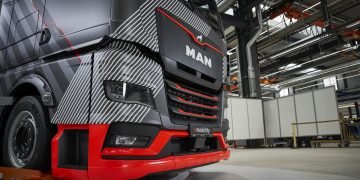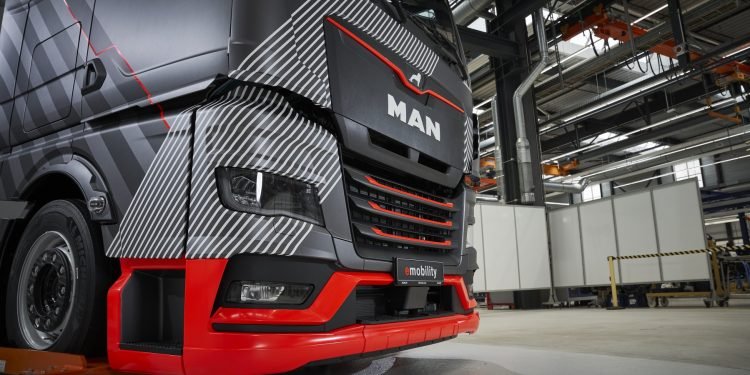By Eva Richardson | The Logistic News
April 11, 2025
In a landmark move toward electrification and sustainable freight transport, MAN Truck & Bus has unveiled its most ambitious strategy yet: a multi-pronged initiative that combines cutting-edge eTruck deployment, strategic partnerships, and the buildout of Europe’s first megawatt-scale electric truck charging network.
With the delivery of its first eTGX heavy-duty electric truck to automotive supplier DRÄXLMAIER Group—destined for zero-emission logistics to Porsche’s Leipzig facility—MAN has signaled not only a technological leap but a supply chain transformation in motion.
From Innovation to Implementation
More than a prototype or pilot, the eTGX enters service with real-world applications in one of Europe’s most logistics-intensive sectors: automotive just-in-time manufacturing. DRÄXLMAIER and logistics partner Duvenbeck are the first adopters of the MAN eTGX, with Duvenbeck expected to integrate up to 120 units into its Volkswagen Group Logistics operations by 2026.
Designed for the high-volume automotive industry, the eTGX features a low-liner chassis suitable for three-meter internal-height trailers—proof that MAN is engineering beyond emissions compliance to meet real operational demands.
“This is the next chapter of logistics,” said Alexander Vlaskamp, CEO of MAN Truck & Bus. “It’s not just about electrifying a fleet—it’s about reimagining the infrastructure and intelligence that power it.”
One Million Configurations, One Scalable Vision
Unveiled at the IFAT 2025 fair, the new MAN eTGX and eTGS models represent one of the most modular eTruck platforms on the market, offering over one million customizable configurations. From wheelbase to cab type, engine output to battery count, the trucks cater to a broad spectrum of industries—from waste management to long-haul freight.
The eTGX promises a daily range of 600–800 kilometers, supported by an intelligent battery system with a projected lifespan of 1.6 million kilometers or 15 years.
Building the Infrastructure: The E.ON and ABB Factor
Perhaps the most transformative element of MAN’s strategy is its investment in charging infrastructure. Through a partnership with E.ON, MAN is building a pan-European electric truck charging network, with 80 high-capacity charging sites scheduled for activation by the end of 2025 and up to 170 locations by 2030.
Initial stations will use 400 kW chargers, allowing eTrucks to gain up to 300 kilometers of range in just 45 minutes. Meanwhile, in collaboration with ABB E-mobility, MAN is accelerating the development of megawatt charging systems—technology critical to the future of electric long-haul logistics.
Scaling Success: From eBuses to eTrucks
While the eTruck rollout grabs headlines, MAN is already a dominant player in European e-mobility. Its Lion’s City E electric bus was Europe’s top-selling model in 2023, earning a 13.3% market share. The company now aims to replicate this success across the heavy-duty road freight sector.
“MAN’s approach is holistic,” said Felix Brenner, transportation analyst at EcoFreight Index. “They’re not just selling trucks—they’re building an ecosystem. And that’s what will set the winners apart in the next decade of logistics.”
What It Means for Shippers and Carriers
For logistics operators, MAN’s offering is more than an electric truck—it’s a blueprint for total fleet transformation. With regulatory pressures mounting under the EU’s Green Deal and city-level diesel bans fast approaching, early adoption of electric fleets may soon shift from competitive advantage to operational necessity.
Carriers with strong retail, automotive, and FMCG clients are especially likely to benefit, as these sectors push for emissions transparency and ESG-aligned freight strategies.
Looking Ahead:
With a fleet-ready product, infrastructure roadmap, and strong industrial partnerships, MAN has made clear its ambition to lead Europe’s shift toward electrified freight. The only question left is: Who’s ready to follow?
Eva Richardson is a senior correspondent at The Logistic News, specializing in transport electrification, infrastructure policy, and global supply chain innovation.





















